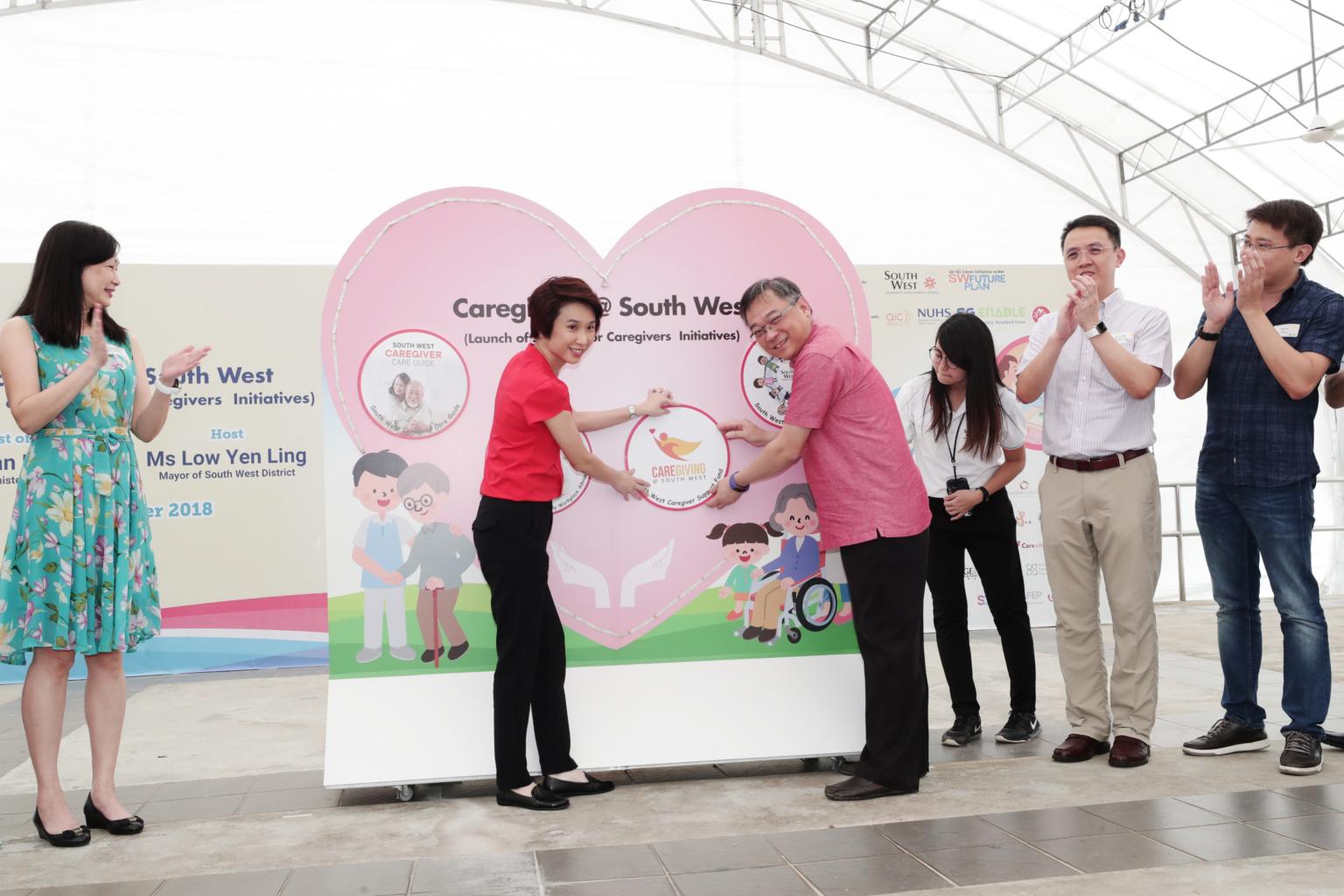More support for caregivers to seniors to help them cope with duties and stress
Sign up now: Get ST's newsletters delivered to your inbox

South West District Mayor Low Yen Ling and Health Minister Gan Kim Yong launch phase two of a district-wide Caregiving @ South West programme on Dec 1, 2018.
ST PHOTO: KELVIN CHNG
Follow topic:
SINGAPORE - More help is on the way for residents in the South West District who are caregivers to elderly family members.
South West District Mayor Low Yen Ling on Saturday (Dec 1) announced three new initiatives by the South West Community Development Council (CDC) to better support caregivers, especially in an ageing society with smaller families.
One key initiative is the South West Caregiver Support Fund. Caregivers can receive interim financial assistance of $500 to help them pay for expenses like medical equipment, transport costs for medical appointments, training in caregiving or counselling. It is meant to supplement national schemes that provide more long-term assistance.
For a start, a total of $150,000 will be set aside for 300 caregivers in the next three years.
They will also benefit from a reference guide, produced with the Agency for Integrated Care, which offers information and tips to help caregivers look after their loved ones as well as take care of their own emotional health.
The Care Guide booklet, which will be available at community clubs and social service organisations from the first quarter of next year, contains questions that the caregivers need to ask hospital staff before family members are discharged, for instance. It also offers advice on how to create a routine care schedule and engage with other caregivers for support.
The third initiative is a workplace advisory that the South West CDC came up with, together with the Tripartite Alliance for Fair and Progressive Employment Practices and Workforce Singapore.
The advisory is meant as a guide for employers to make workplaces more friendly for caregivers, through practical ideas like flexi-work arrangements.
In a speech at the launch of the initiatives, Ms Low said: "Besides finances, we are mindful of how the well-being of caregivers themselves can be affected by the load of caregiving."
She cited a study by Tan Tock Seng Hospital's Institute of Geriatrics and Active Ageing which found that 40 per cent to 60 per cent of caregivers of people with dementia suffer from significant stress.
She also highlighted the need for more workplaces to be flexible and understanding, especially towards caregivers who have to juggle work demands with accompanying family members to doctors' appointments or therapy sessions.
"As our population ages, more of us will become caregivers, and many will need to continue to work to support the family and caregiving expenses," she said.
Health Minister Gan Kim Yong, who attended the event on Saturday, said caregivers play a vital role in supporting seniors, even as the Government ramps up community care services.
He said the Ministry of Health has started a review to strengthen support for senior caregiving. It expects to complete consultations by the end of the year and propose a set of recommendations next year.
By 2030, one in four Singaporeans will be 65 years old and above, up from one in seven currently.
Mr Gan encouraged more local efforts like that of the South West CDC to reach out to caregivers who need support.
"All of us can lend a helping hand to help the elderly and also their caregivers in our midst," he said. "Every little action goes a long way."
At the age of 71, Madam Teo Ino Neo is keeping herself busy and active by exercising and meeting friends, on top of taking care of her 90-year-old aunty with dementia and working part time as an office cleaner.
Madam Teo, who was also a caregiver to her late mother and husband, said she hopes to learn new exercises to keep fit.
Another caregiver Richard Ashworth stopped work as an office manager 18 years ago to take care of his father who has had a host of health problems, from colon and skin cancer to high blood pressure.
His 85-year-old father now has severe dementia.
"It can be quite stressful, and I have to be home most of the time. I do miss my job," said the 64-year-old who is now a volunteer with National Parks Board. He spends about $1,000 a month on consumables like diapers and medicine for his father.
"Sometimes I feel sad, but I also learn to have patience, compassion and confidence that I can continue to take care of him," said Mr Ashworth, who is unmarried.
He encouraged other caregivers to share their experiences and burdens with each other.
"Most people are reluctant to talk about a family member with dementia, but I hope they can open up so they know they're not alone."

